Key takeaways:
- Research ethics prioritize the dignity, rights, and welfare of participants, fostering trust and accountability between researchers and those involved.
- Key principles include informed consent, confidentiality, and integrity in research design, emphasizing that participants should be respected as individuals.
- Strategies for ensuring ethical compliance involve interactive consent processes, regular ethics training, and early involvement of ethics review boards.
- Navigating ethical dilemmas requires a balance between research goals and the moral implications of actions, continually reflecting on the impact of research on vulnerable populations.
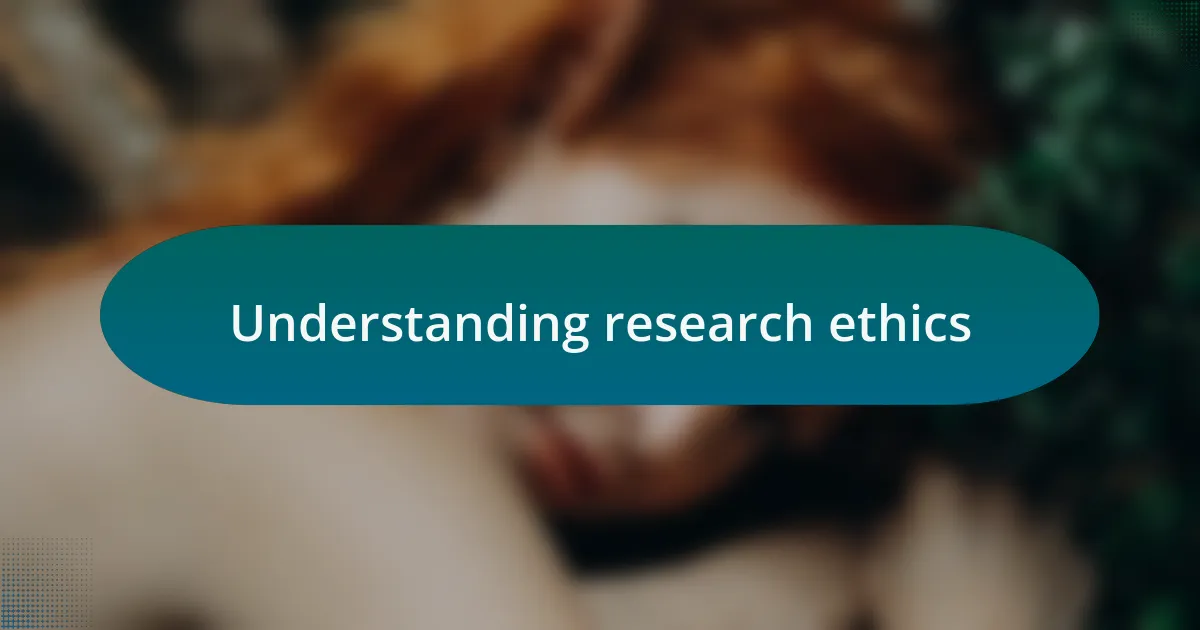
Understanding research ethics
Research ethics is fundamentally about protecting the dignity, rights, and welfare of research participants. I remember the first time I presented my research proposal; the discussions around ethical considerations were profound. It made me realize how crucial it is to navigate the delicate balance between scientific inquiry and the moral obligations we hold towards individuals.
When I think about informed consent, I can’t help but reflect on my experience with participants who shared their stories with me. It wasn’t just a form we filled out; it was about respect and transparency. How do we convey to participants that their involvement is valued and that they have a choice in the process? It’s an ongoing conversation that I find vital in establishing trust.
Moreover, ethical considerations extend beyond just participants. I often ponder the implications of data integrity and academic honesty in our work. Are we ensuring that our research practices uphold the highest standards? For me, maintaining transparency and accountability is not just important—it’s a core part of who I am as a researcher.
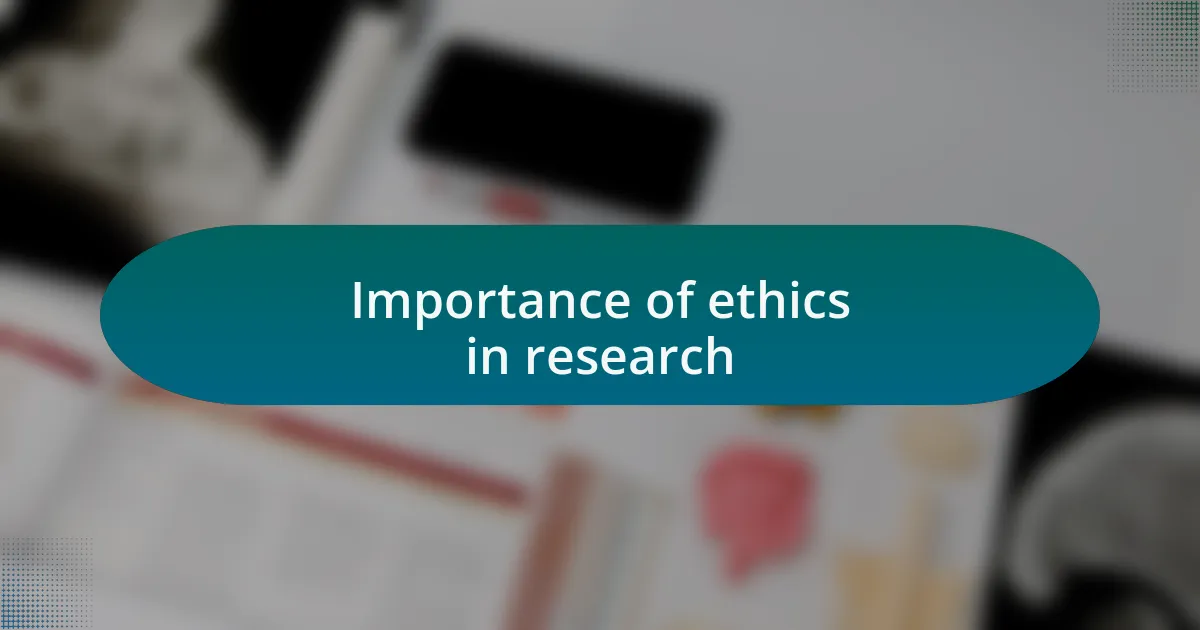
Importance of ethics in research
Research ethics play a pivotal role in fostering trust between researchers and participants. I vividly recall a project where I was deeply involved in interviews. The participants opened up about their lives, and it struck me how essential it was to honor their vulnerability. Without adhering to ethical standards, we risk not just our credibility but also the wellbeing of those who share their stories with us.
Consider the consequences of unethical research practices. I remember an unsettling case from my studies where data manipulation led to harmful misconceptions in the community. It made me realize that we have a responsibility that extends beyond our academic pursuits. I often ask myself, how can we justify our findings if they’re built on shaky foundations? Ethical integrity is not just a guideline; it’s a necessity for genuine scientific advancement.
Furthermore, research ethics safeguard the advancement of knowledge itself. When we prioritize ethical considerations, we create a transparent environment that encourages collaboration and innovation. I’ve seen firsthand how ethical practices can lead to more robust findings and greater societal impact. Don’t we owe it to ourselves and those who come after us to pave a path of integrity and respect in our research endeavors?
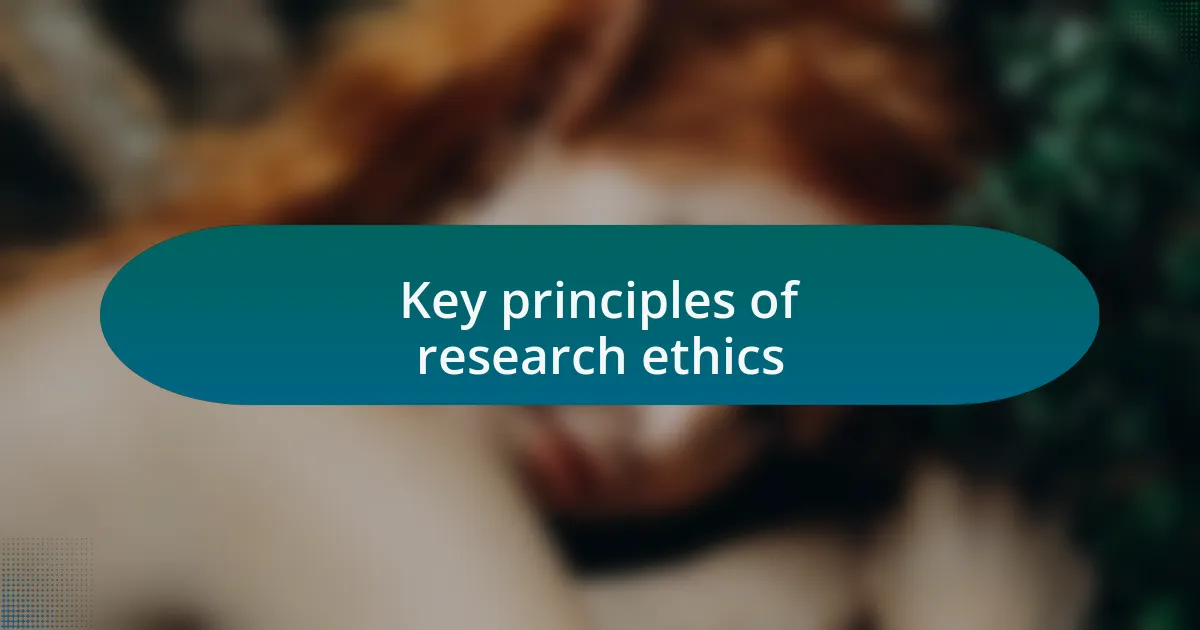
Key principles of research ethics
Research ethics are founded on several key principles that guide the conduct of studies. One of the most critical aspects is informed consent. I remember my initial experiences seeking consent from study participants. It wasn’t just about getting a signature; it was about ensuring that they understood not only the nature of the research but also their rights. This process fostered a genuine connection and respect, reminding me that our participants are not just data points—they are individuals with their own stories and choices.
Another essential principle is confidentiality. I’ve been in situations where I had to navigate sensitive information. There was a time when a participant shared personal details that could easily identify them. I felt a heavy responsibility to protect that information, which heightened my awareness of ethical obligations. How can we expect participants to trust us if we don’t safeguard their privacy? Upholding confidentiality not only protects individuals but also enhances the credibility of our research.
Lastly, integrity in research design and data reporting cannot be overlooked. I recall a project where I had access to intriguing findings, but I faced a dilemma: should I present the information as it was, even if it didn’t align with my hypothesis? Ultimately, I chose transparency, which reinforced my belief that ethical adherence is not just a compliance measure but a foundation for genuine inquiry. Doesn’t it feel liberating to pursue the truth, knowing that your work contributes to the greater good?
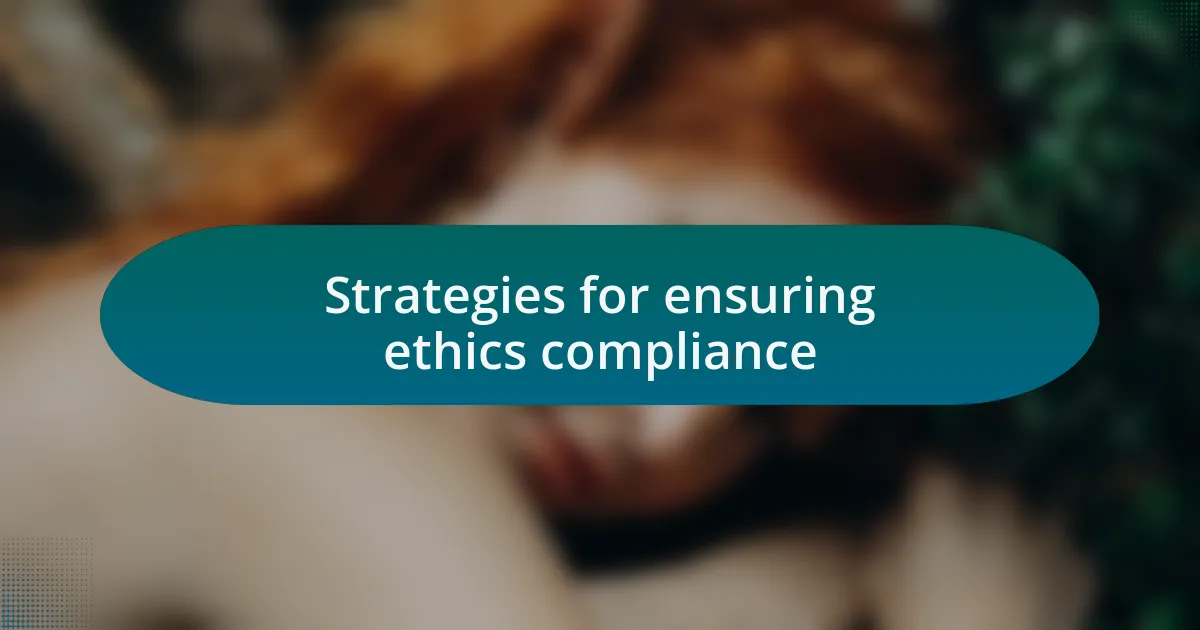
Strategies for ensuring ethics compliance
One effective strategy I’ve found for ensuring ethics compliance is establishing clear protocols for informed consent. During a recent project, I implemented an interactive consent process, allowing participants to ask questions in real-time. This not only made them feel more comfortable but also empowered them, making the consent process a dialogue rather than a formality. Isn’t it fascinating how such an approach can transform participants from passive subjects to active collaborators?
Regular ethics training for the research team is another strategy I advocate. I remember leading a workshop where we explored various ethical dilemmas, sparking lively discussions. It reminded me that ethics isn’t just a checklist; it’s an evolving conversation. Wouldn’t we all benefit from continual learning about the ethical implications of our work and the impact it has on others?
Additionally, I’ve noticed that involving an ethics review board early in the research design can significantly enhance compliance. In one instance, submitting my proposal for preliminary feedback led to crucial insights that I hadn’t considered. It was a humbling experience, reinforcing the notion that collaboration and critique can strengthen our commitment to ethical standards. How often do we overlook the value of external perspectives that challenge our assumptions?
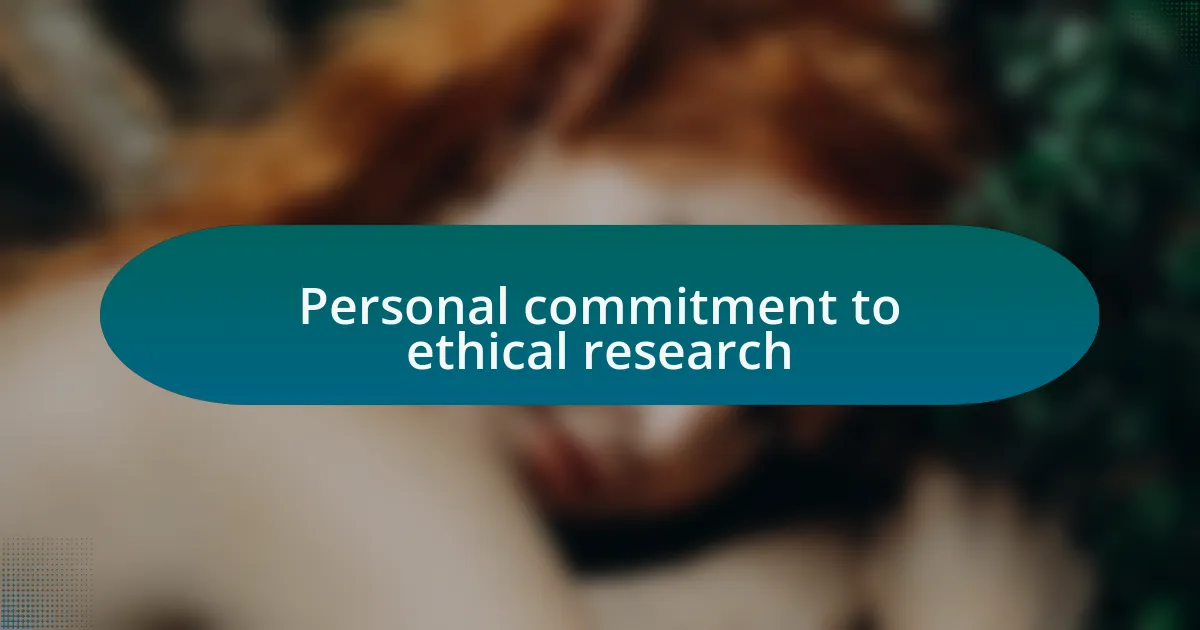
Personal commitment to ethical research
My personal commitment to ethical research is rooted in a profound respect for the individuals involved. During my early days as a researcher, I made a mistake by overlooking the nuances of cultural sensitivities when recruiting participants. This experience taught me that ethical considerations go beyond compliance; they require empathy and a deep understanding of diverse perspectives. How often do we stop to consider how our actions impact those who contribute to our studies?
I believe that maintaining transparency is a cornerstone of ethical research. After conducting a study on sensitive topics, I ensured that all findings were shared not just with academic circles but also with the participants who shared their stories with me. This approach reinforced trust and demonstrated my accountability to them. When have you felt that openness transformed the dynamic of a relationship?
Moreover, I constantly reflect on my motivations and the potential ramifications of my research. There was a time I had to pause a project, realizing potential exploitation of a vulnerable population. This moment of introspection was crucial; it reminded me that our pursuit of knowledge should never come at the expense of those we study. Are we truly ready to confront the ethical implications of our work, even when it means altering our course?
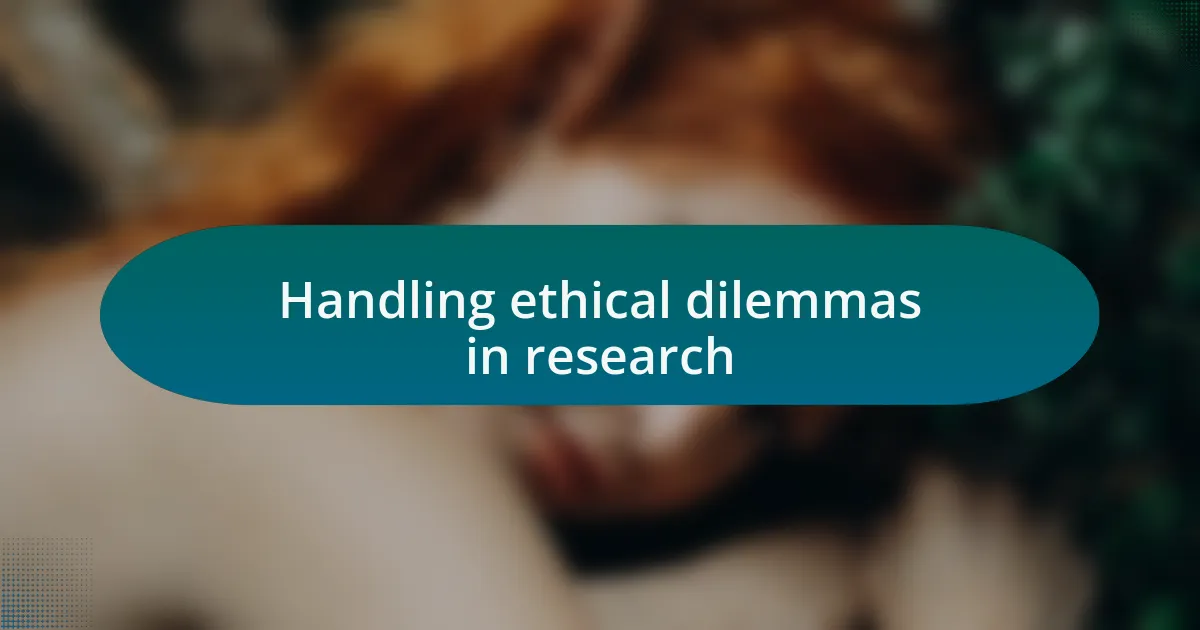
Handling ethical dilemmas in research
Navigating ethical dilemmas in research can often feel like walking a tightrope. I faced an intense moment in one of my studies when I realized that the data I was about to collect might unintentionally stigmatize a marginalized group. Those moments forced me to reconsider not just the research design, but also the moral implications of my actions. Have you ever felt a conflict between what you want to achieve and what is right?
In another instance, I was confronted with a situation where a participant revealed sensitive information that could jeopardize their safety if disclosed. It was a heart-wrenching choice: should I publish their story, or protect their anonymity? I chose the latter, understanding that ethical research is about prioritizing the well-being of individuals over the pursuit of impactful findings. How do we balance the quest for knowledge with the duty of care for those who trust us with their narratives?
The uncomfortable truth is that ethical dilemmas are inevitable in research, but they also provide an opportunity for growth. I often remind myself that a moment of discomfort might lead to profound insights. Reflecting on these challenges not only shapes how I conduct my research but also deepens my empathy and commitment to ethical standards. When was the last time you let a difficult decision reshape your understanding of ethics?